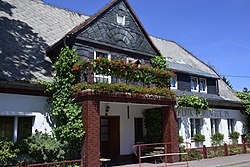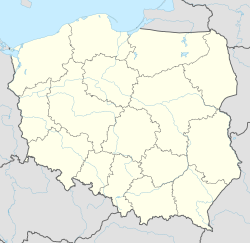Borowice [bɔrɔˈvit͡sɛ] (German: Baberhäuser) is a village in the administrative district of Gmina Podgórzyn, within Jelenia Góra County, Lower Silesian Voivodeship, in south-western Poland.[1]
Borowice | |
|---|---|
Village | |
 Building in the village | |
| Coordinates: 50°47′21″N 15°41′42″E / 50.78917°N 15.69500°E | |
| Country | |
| Voivodeship | Lower Silesian |
| Powiat | Karkonosze |
| Gmina | Podgórzyn |
| Founded | 1644 |
| Time zone | UTC+1 (CET) |
| • Summer (DST) | UTC+2 (CEST) |
| Vehicle registration | DJE |
It lies approximately 13 km (8 mi) south of Jelenia Góra, and 102 km (63 mi) west of the regional capital Wrocław.
History
editThe area became part of the emerging Polish state in the 10th century. Initially it was administratively part of the Wleń castellany.[2] The village was founded in 1644 by Swiss carpenter Martin Markensteiner, who fled from Bohemia during the Thirty Years' War.[3]
During World War II, in 1940–1942, the Germans used Belgian, French and Soviet prisoners of war and possibly also Czech and Polish civilians for forced labour to build a road connecting the village with Przełęcz Karkonoska, now known as Droga Borowicka ("Borowice Road"), however, the construction was not completed.[4]
Gallery
edit-
Wooden house
-
Hotel
-
Memorial to Allied POWs murdered by Nazi Germany in WWII
References
edit- ^ "Central Statistical Office (GUS) - TERYT (National Register of Territorial Land Apportionment Journal)" (in Polish). 2008-06-01.
- ^ Staffa, Marek (2001). Karkonosze (in Polish). Wrocław: Wydawnictwo Dolnośląskie. p. 40. ISBN 83-7023-560-3.
- ^ Staffa, p. 70
- ^ Przerwa, Tomasz (2020). "Zatrudnienie jeńców belgijskich, francuskich i radzieckich przy budowie Drogi na Przełęcz Karkonoską (Spindlerpaßstraße) 1940–1942". Łambinowicki rocznik muzealny (in Polish). 43. Opole: 5, 8–9, 16. ISSN 0137-5199.
